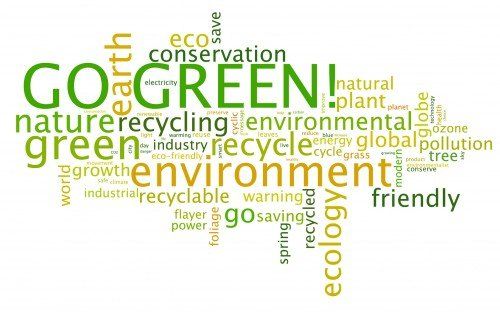Go Green!
At Work
- Turn lights off when you leave a room for more than a few minutes
- Set your computer to go to sleep, not just to a screen saver, for short periods of inactivity
- Turn your computer off when you leave for the day
- Take the stairs instead of the elevator
- Use a manual pencil sharpener
- Learn what can and cannot be recycled
- Print both sides of paper or use the back side of scrap paper
- E-mail co-workers instead of printing and distributing information
- Ask to be removed from mailing lists for unwanted newsletters, catalogs, etc.
- Donate or properly recycle old electronic equipment
- Recycle toner and ink cartridges
- Drink filtered water instead of bottled water
- Keep reusable dishes, silverware and mugs at the office
- Carry your lunch in a reusable lunch bag
- Decorate your work area with plants to absorb indoor pollution
- Bring organic food to company potlucks, picnics and parties
Using Vehicles
- Use public transportation when possible while traveling for business
- Telecommute if you can
- Carpool to work
- Properly inflate your tires
- Increase your speed slowly when driving, this uses less gas
- When driving 40 mph or less, roll down the windows rather than using the air conditioner
- Park your vehicle and go inside restaurants instead of using the drive through
- If you’re stopping your vehicle for more than 30 seconds, turn it off
- Call stores to see if they have what you want before driving there
- Complete several errands during a single trip
- Choose a more fuel-efficient vehicle the next time you purchase, lease or rent one
- Bike or walk to places instead of driving
- Use public transportation instead of a car
- Keep your vehicles tuned-up
At Home – HVAC
- Close curtains to keep out the hot summer sun
- Open curtains to let in the warm winter sun
- Seal any air leaks around windows and doors
- Set the thermostat a little lower in the winter and higher in the summer
- Close heating and cooling vents in unused rooms
- Put on sweaters instead of turning up the heat
- Clean air filters on your furnace and air conditioners
- Close the damper when the fireplace isn’t being used
- Set your water heater to 120 degrees F
- Set your refrigerator to 40 degrees F
At Home – Appliances
- Turn off the TV if you’re not watching it, or the radio/stereo if not listening to it
- Replace burnt-out light bulbs with compact fluorescent light bulbs
- If you need a new appliance, choose “Energy Star” rated
- Wash clothes in cold water
- Clean off the lint screen on your clothes dryer after every use
- Turn off electronics at the power strip, not just the power button
- Put lids on pots to heat food more quickly
- Hang clothes out to dry
- Take advantage of natural light from windows whenever possible
- Air dry dishes in your dishwasher instead of using the dry cycle
- Completely fill the dishwasher before running it
- Decide what you want before you open the refrigerator door
- Avoid pre-rinsing dishes headed for the dishwasher
- Wash only full loads of clothes
- If you use batteries, buy the rechargeable kind
At Home – Water
- Install low-flow showerheads
- Turn off the water while brushing your teeth
- Drink from a reusable glass instead of a disposable cup
- Carry a travel mug; use it instead of paper cups at stores, coffee shops, convenience stores and restaurants
- Wash plastic tableware and use it again
- Rinse and reuse glass jars and containers
At Home – Solid and Food Waste
- Store leftover food in reusable containers not in plastic wrap or foil
- Create and maintain a compost pile
- Find a FreecycleTM group to trade things you no longer want for things you do want
- Buy nontoxic household cleaners
- Use sponges and rags instead of paper towels
- Carefully unwrap gifts and reuse the paper
- Stop newspaper delivery while on vacation
- Invest in cloth napkins
- Wrap gifts in the Sunday comics
- Take old paint cans and batteries to your town’s hazardous waste center. Whole Foods offers recycling of batteries, plastic bags, wine corks, cell phones, etc)
- Take yourself off junk mail lists
At Home – Purchasing
- Buy products in packages that can be recycled
- Look for items made from recycled materials
- Buy products in bulk
- Mend and repair clothes, equipment and toys rather than buying new ones
- Choose the most durable products
- Avoid items made from rainforest trees
- Pick products that have little or no packaging
- Shop at second hand stores
- Get your produce from your local farmer’s market
- Choose organic food whenever possible
- Donate unwanted items to charity thrift stores
- Bring reusable shopping bags on trips to the store
- Don’t get a bag if buying 1 or 2 items
- If you purchase diapers, choose cloth instead of disposable
At Home – Yard Care
- Plant trees in your yard
- Use a push mower to trim the lawn
- Clear off the sidewalk and driveway with a broom instead of a blower
- Use a shovel to remove snow accumulations
- Pull weeds instead of using chemicals
- Take care to water only your lawn, not the sidewalk and street
- Do not disturb wild plants or animals
- Build a birdhouse to attract bug-eating birds
- Landscape with native plants
- Water outside early in the morning
- Immediately repair broken landscaping irrigation
At Home – Other
- Educate yourself about global warming
- Write a letter to the local newspaper asking people to go green
- Urge elected officials to take action
- Thank others for doing their part in going green






